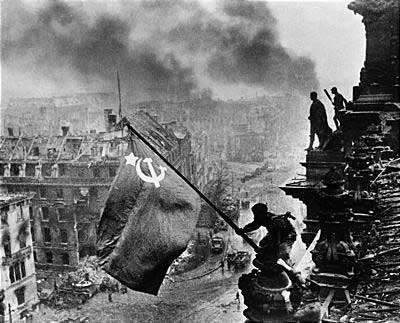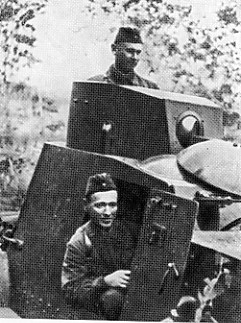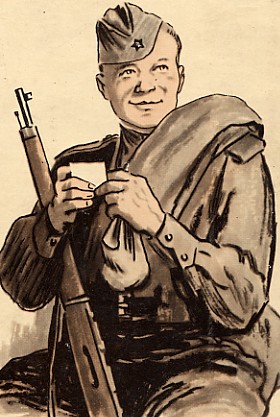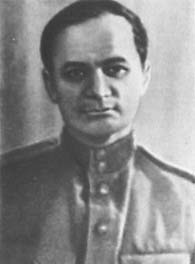
presents
SOVIET WRITERS AT WAR!
Reports, articles, sketches, stories, propaganda, and more
from the period of the Great Patriotic War, 1941-1945
In memory of the 275 Soviet writers
who fell in battle.
 In Berlin's Neighborhoods by Boris Gorbatov. (April 1945) Soviet novelist Boris Gorbatov, working as a war corresondent, was with the Red Army as it captured Berlin. He witnessed the street fighting, the fierce but pointless resistance of hold-out S.S. cutthroats. He also saw the cringing, fearful surrender of other Germans, holding out babies' diapers as flags of surrender. In his dispatch, "In Berlin's Neighborhoods", Gorbatov naturally took the opportunity to gloat and taunt the Berliners. But he was also careful to point out that some Germans were anti-fascist. Nor does the Soviet army have the idiotic goal of the destruction or enslavement of the German people. The important message is that Hitler's citadel of obscurantism and piracy is at its end.
In Berlin's Neighborhoods by Boris Gorbatov. (April 1945) Soviet novelist Boris Gorbatov, working as a war corresondent, was with the Red Army as it captured Berlin. He witnessed the street fighting, the fierce but pointless resistance of hold-out S.S. cutthroats. He also saw the cringing, fearful surrender of other Germans, holding out babies' diapers as flags of surrender. In his dispatch, "In Berlin's Neighborhoods", Gorbatov naturally took the opportunity to gloat and taunt the Berliners. But he was also careful to point out that some Germans were anti-fascist. Nor does the Soviet army have the idiotic goal of the destruction or enslavement of the German people. The important message is that Hitler's citadel of obscurantism and piracy is at its end.  June-December by Konstantin Simonov. On the third day of the war, Soviet writer Konstantin Simonov came under Nazi bombardment as he traveled westward toward the front. During those early days, Soviet troops were confused, uncertain, frightened. As a war correspondent, Simonov saw this first-hand. By December 1941, however, Simonov was able to report, "A tremendous, magnificent change has taken place in the psychology of our troops. Our army has learnt how to conquer the Germans." How this change came about--and how the Germans learned to fear--is described by Simonov in this short report.
June-December by Konstantin Simonov. On the third day of the war, Soviet writer Konstantin Simonov came under Nazi bombardment as he traveled westward toward the front. During those early days, Soviet troops were confused, uncertain, frightened. As a war correspondent, Simonov saw this first-hand. By December 1941, however, Simonov was able to report, "A tremendous, magnificent change has taken place in the psychology of our troops. Our army has learnt how to conquer the Germans." How this change came about--and how the Germans learned to fear--is described by Simonov in this short report.In the Name of Kirov by Aleksandr Fadeev. Fadeev's report on a visit to workers at the Putilov Works in Leningrad during the blockade. The difficulties and heroism of the workers, subjected to daily bombardment, are described. The author also sings the praises of the women of Leningrad, who have proven themselves just as capable as men at any job and who shed blood just as men do. Hungry for culture, the workers attend a hastily arranged literary evening; they sit motionless and enrapt, ignoring the bombs that are falling outside.
 Volga - Mississippi by Konstantin Fedin. (1942). A war-time appeal to Americans, comparing the Volga and Mississippi rivers.
Volga - Mississippi by Konstantin Fedin. (1942). A war-time appeal to Americans, comparing the Volga and Mississippi rivers.
Freedom or Death by Ilya Ehrenburg. (1941). Written in the first weeks of the war, this short piece summarizes the Nazis' evil intentions and characterizes the Soviet resolve to fight on mercilessly until Victory Day!
In the Main Line of Attack by Vasily Grossman. (1942). Describes life and death in a division of Siberian troops who had to bear the brunt of the most frenzied period of Nazi attacks on Stalingrad, withstanding 80 straight hours of bombardment, and more.
The Last Wish by Pyotr Pavlenko. (1942). At the Battle of Sevastopol, a dying marine gets his wish to have his image and words preserved on film for posterity.
FICTION / DOCUDRAMAS:
 Vasili Tyorkin: Story of a Soldier
by
Aleksandr Tvardovsky
(1942 - 1945). The most popular work of literature among Soviet soldiers during the war was Aleksandr Tvardovsky's
poem Vasili Tyorkin: A Book About a Soldier..
Appearing in installments between 1942 and 1945, it presented a new folk hero who was everything a Soviet soldier
could ever hope to be--clever, witty, inventive, thoughtful, resourceful, dependable, courageous, loveable, fun-loving, and calm under fire. Vasili Tyorkin fought Nazis hand-to-hand, was wounded several times, slogged through marshes, swam a freezing river to rescue his comrades, shot down a plane with his rifle, settled arguments, made with the wisecracks and could play a mean accordion. So true and human was Tvardovsky's creation that most Soviet soldiers came to believe that Tyorkin was a real person; many even (mistakenly) remembered seeing him in their units. sovlit.net now presents a bilingual Russian-English version of two chapters from Tvardovsky's war-time folk epic: Tyorkin Wounded and The Accordion. Winner of the Stalin Prize.
Vasili Tyorkin: Story of a Soldier
by
Aleksandr Tvardovsky
(1942 - 1945). The most popular work of literature among Soviet soldiers during the war was Aleksandr Tvardovsky's
poem Vasili Tyorkin: A Book About a Soldier..
Appearing in installments between 1942 and 1945, it presented a new folk hero who was everything a Soviet soldier
could ever hope to be--clever, witty, inventive, thoughtful, resourceful, dependable, courageous, loveable, fun-loving, and calm under fire. Vasili Tyorkin fought Nazis hand-to-hand, was wounded several times, slogged through marshes, swam a freezing river to rescue his comrades, shot down a plane with his rifle, settled arguments, made with the wisecracks and could play a mean accordion. So true and human was Tvardovsky's creation that most Soviet soldiers came to believe that Tyorkin was a real person; many even (mistakenly) remembered seeing him in their units. sovlit.net now presents a bilingual Russian-English version of two chapters from Tvardovsky's war-time folk epic: Tyorkin Wounded and The Accordion. Winner of the Stalin Prize. Young Guard by Aleksandr Fadeev (1947). In Nazi-occupied Ukraine, a group of teenagers forms a secret underground organization. They engage in sabotage, arson and various forms of wrecking. They engineer a prison break and murder a filthy collaborator. The Nazis finally catch then just weeks before liberation by Soviet troops. They are brutally tortured and murdered. Based on real people and real events. Winner of the Stalin Prize. (Click here for detalied summary)
In the War by Grossman, Vasili (1942). A loner tank-driver slowly comes to feel and realize the strength and value of comradeship with his fellow tank- crew members. Translated by Andrew Glikin-Gusinsky. (Click here for entire text in English)
Days and Nights by Simonov, Konstantin (1944). A batallion commander and his troops defend three apartment buildings (or rather the rubble of three buildings) for seventy days during the Battle of Stalingrad. They suffer incredible casualties, demonstrate incredible bravery, and get lots of medals. And during it all, the hero even finds time to fall in love, get married, and have a bachelor party. (Click here for detailed summary)
Hot Snow by Bondarev, Yuri (1969). An artillery battery at Stalingrad fights against cold, hunger, and encirclement. Some soldiers are heros, others come unglued; all are in some way flawed. "Friendly fire" takes a toll. Counterintelligence unjustly suspects a competent general of harboring traitorous intentions. Suggestions are made that Stalin is less than perfect. And through it all, the men fight among themselves to win the love of the alluring medical instructor Zoya! (Click here for detailed summary)
Son of the Regiment by Kataev, Valentin P. (1946). An orphan boy is picked up by a Soviet front-line artillery unit. He becomes one of them, going on a secret mission behind German lines and taking part in a fierce and bloody battle. Stalin Prize winner, 1946.. (Click here for detailed summary)
Volokolamsk Highway by Aleksandr Bek (1944). One batallion's battle against the Nazis as well as their own fears in the early stages of the Defense of Moscow. Initially terrified by the seemingly unstoppable enemy, the ranks are plagued with cowardice and desertion. A few executions help restore discipline, and a few well-planned sneak attacks teach the men that the Germans bleed and die, too. In the end, the troops fight bravely, the commanders strategize creatively, and the Red Army wins valuable time.(more)
 The Seventh Man by
Andrei Platonov
To save on ammunition, the Nazis try executing seven prisoners with a single bullet. One partisan miraculously survives the ordeal and escapes. However, driven to despair by the loss of his family, he returns to the same prison camp and again is the seventh man in the execution line. He finally achieves the death he so greatly desires. An eighth man, however, longing to live, feigns death to cheat death. (more)
The Seventh Man by
Andrei Platonov
To save on ammunition, the Nazis try executing seven prisoners with a single bullet. One partisan miraculously survives the ordeal and escapes. However, driven to despair by the loss of his family, he returns to the same prison camp and again is the seventh man in the execution line. He finally achieves the death he so greatly desires. An eighth man, however, longing to live, feigns death to cheat death. (more)
Snow by Paustovsky, Konstantin. During the Great Patriotic War, a soldier on leave returns to his childhood home, only to find that his father has died and a strange young woman is now living in his house. Out of kindness and a feeling of responsibility, the woman tries to make the home seem familiar for the soldier. The soldier is grateful and touched. He is certain that they have met before in the Crimea and that fate has now reunited them. Actually, the woman has never been to the Crimea--but does it really matter? (Click here for detailed summary)
The Life and Amazing Adventures of the Soldier Ivan Chonkin by Voinovich, Vladimir. At the beginning of World War II, a not-too-bright Red Army soldier, abandoned and forgotten by his superiors, bravely defends a Soviet airplane, gets a girlfriend, arrests the entire local apparatus of the secret police, and beats back the attack of an entire regiment...all by accident. (Click here for detailed summary)
